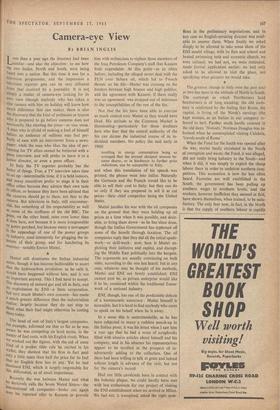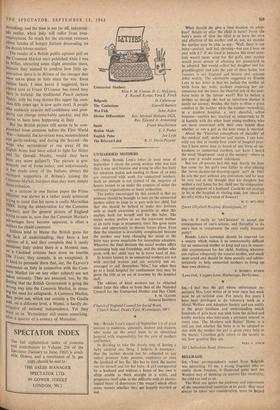Camera-eye View
By BRIAN INGLIS LEss than a year ago the itinerary had been similar—and also the objective: to sec how the two Italics, North and South, were being fused into a nation. But this time it was for a television programme; and the impression a television reporter gets can be very different from that received by a journalist It is no simply a matter of camera-eye looking for its OW n view (though anybody who has taken a eine camera with him on holiday will know how much difference that can make), there is also the discovery that the kind of politician or tycoon Who is prepared to go before cameras does not necessarily like meeting the press—or vice versa. A man who is afraid of making a fool of himself before all audience of millions may feel per- fectly at ease with an interviewer from a news- paper; while the man who likes the idea of per- forming for TV often cannot be bothered with a Press interview, and will prefer to leave it to a lUnior director, or even a press officer.
In Italy the TV reporter probably has the better of things. True, a TV interview takes time to set up—interminable time, if it is held indoors, and many executives prefer to stage it in their ?Mce either because they admire their own taste iO offices, or because they have been advised that the cameras should go to them, not they to the Camera. But television in Italy, still uncommer- cial, has something of the respectability as well as some of the stuffiness of the old BBC. The Press, on the other hand, rates even lower than does here, not because it is more irresponsible 'F'r gutter-perched, but because many a newspaper is the appendage of one of the power groups in industry, used intensively for plugging the in- terests of their group, and for hatcheting its enemies—notably Enrico Mattei.
Mattel still dominates the Italian industrial scene, though it has become fashionable to assert that the hydrocarbon revolution, as he calls it, Would have happened without him, and is not so important anyway. This I find hard to accept. The discovery of natural gas and oil in Italy, and its exploitation by ENI—a State corporation, but very much Mattei's own concern—has made a much greater difference than the industrialists realise; largely because they do not stop to Think what their fuel might otherwise be costing them today.
The head of one of Italy's largest companies, for example, informed me that so far as he was aware he was competing on level terms, in the matter of fuel costs, with his English rivals. When We worked out the figures, with the aid of some kind of a pocket slide rule he carried in his wallet, they showed that his firm in fact paid Only a little more than half the price for its fuel that an English firm has to pay. Yet he had dismissed ENI, which is largely responsible for this differential, as of small importance.
Recently the war between Mattei and what he derisively calls the Seven Weird Sisters—the international oil companies—broke out again , over his reported offer to Kassem to provide him with technicians to replace those members of the Iraq Petroleum Company's staff that Kassem finds expendable. At this point—as so often before; including the alleged secret deal with the FLN over Sahara oil, which led to French threats on his life—Mattei was crossing on the borders between high finance and high politics; and the agreement with Kassem, if there really was an agreement, was dropped out of deference to the susceptibilities of the rest of the Six.
Not that the Six have been able to exercise as much control over Mattei as they would have liked. His attitude to the Common Market is illuminating—particularly for those doubters here who fear that the central authority of the Six can dictate the industrial course of its in- dividual members. No policy (he said early in 1960) resulting in energy consumption being so arranged that the present cheapest sources be- come dearer, or in hindrance to further price reductions, can be acceptable to Italy, and when this translation of his speech was printed, the phrase went into italics. Naturally the Germans and the French would like to be able to sell their coal to Italy; but they can do so only if they are prepared to sell it at cut prices—their chief competitor being the United States.
Mattei justifies his war with the oil companies on the ground that they were holding up oil prices at a time when it was possible, and desir- able, to bring them down—as he has since done, though the Italian Government has syphoned off some of the benefit through taxation. The oil companies reply that they did all the initial spade- work—or drill-work : now, here is Mattei ex- ploiting their initiative and capital, and disrupt- ing the Middle East politically into the bargain. The arguments are usually convincing on both sides, according to the one last heard; but in any case, whatever may be thought of his methods, Mattei and ENI are firmly established; ENI cannot now be, as private enterprise would like it to be, contained within the traditional frame- work of a national industry.
ENI, though, has one of the predictable defects of a bureaucratic autocracy : Mattei himself is accessible, but it is hard to find anybody who cares to speak on his behalf when he is away.
In a sense this is understandable, as he has been subjected to many a ruthless punch-up in the Italian press; it was his boast when I saw him a year ago that he had a score of scrapbooks filled with abusive articles about himself and his company, and in his absence his representatives appear to be terrified at the prospect of in- advertently adding to the collection. One of them had been willing to talk at great and indeed tedious length in advance of the visit; but not for the camera's record.
Had our little cavalcade been in contact with the bubonic plague, we could hardly have met with less enthusiasm for our project of visiting the ENI establishment when we arrived in Milan. We had not, it transpired, asked the right ques- tions in the preliminary negotiations; and in any case no English-speaking director was avail- able to answer them. When finally we asked simply to be allowed to take some shots of the ENI model village, with its flats and school and heated swimming bath and eccentric church, we were refused; we had not, we were reminded, made formal application earlier; we had only asked to be allowed to visit the place, not specifying what pictures we would take.
The ,greatest change in Italy over the past year or two has been in the attitude of North to South. The contempt in which Northerners hold Southerners is of long standing; the old snob- bery is reinforced by the feeling that Rome, the capital, is living off the North's earnings (the kept woman, as an Italian in our company re- ferred to her). Further south hardly counted in the old days; 'Nobody,' Norman Douglas was in- formed when he contemplated visiting Calabria, 'travels south of Rome.'
When the Fund for the South was opened after the war, stories busily circulated in the North of corruption and waste; the Fund, it was alleged, did not really bring industry to the South—and when it did, it was simply to exploit the cheap labour there in order to undercut northern com- petitors. This accusation is now far less often heard. Factories are well established in the South; the government has been pulling up southern wages to northern levels; and the workers, however inefficient they seemed at first, have shown themselves, when trained, to be satis- factory. The only fear now, in fact, in the North is that the supply of southern labour is rapidly dwindling; and the time is not far off, industrial- ists realise, when Italy will suffer from over- etnployment. So much for the alarmist rumours about hordes of hungry Italians descending on the British labour market.
The results of a British public opinion poll on the Common Market were published while I was II) Milan, attracting some slight attention there, because they seemed to confirm how little ap- preciation there is in Britain of the changes that have taken place in Italy since the war. Even Italian faces, I once heard it suggested, have altered (just as Frank O'Connor has noted they have in Ireland; the traditional Punch cartoon Paddy, with his long shutter-like upper lip, com- mon fifty years ago is now quite rare). A people 'Who suddenly acquire self-confidence and pros- PeritY can change remarkably quickly; and this Seems to have been happening in Italy But the British picture still seems to be com- Pounded from cartoons before the First World War—Antonio, the ice-cream man, moustachioed and garlic-reeking; and during the Second—the wops who surrendered or ran away (if the tighth Army had been asked to fight for Hitler and Sir Oswald Mosley, would they have been any more gallant?). The picture is gro- tesquely out of focus today; and unfortunately It has made some of the Italians, always the strongest supporters of Britain's joining the Common Market, less keen than they were, simply from irritation.
In a cartoon in one Italian paper the Prime Iviinister was shown as a rather seedy aristocrat trying to insist that his name is really Mecmillan tMEC being the abbreviation for the Common Market); and the general picture of England tryiu8 to ease in, now that the Common Market's advantages have become apparent, is often a subject for ribald comment.
Italians tend to blame the British press for the lack of understanding; they have a low °Pinion of it, and they complain that it rarely Mentions Italy unless there is a Montesi case, ot. a Cardinal critcises bare arms on tourists (the Times, they concede, is an exception). It i3 hard to persuade them that, say, the Express's comments on Italy in connection with the Corn- lflon Market (or on any other subject) are not taken seriously. They are annoyed, too, by the feeling that the British Government is going the ,Vvrong way into the Common Market, in stress- mg the need for safeguards. A Common Market, theY point, out, which can contain a De Gaulle and, on a different level, a Mattel, is hardly de- structive of national independence. Yet they ‘v,ant us in. Westminster still means something, atter a quarter of a century of Mussolini.



































 Previous page
Previous page